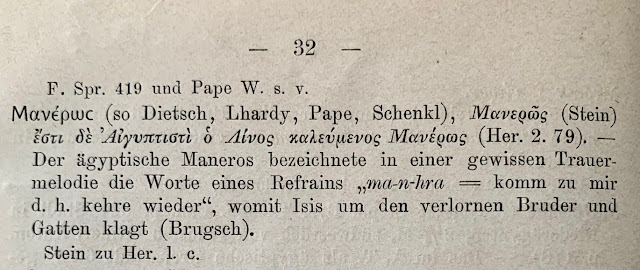 |
| Foreign words in Greek and Latin - Alois Vaniček |
*
Alois Vaniček writes a Greek word of foreign, probably of Thracian origin.
*μανδάκισ / mandakis means bunch of hay AND sheaf ribbon.
Here below you see bunch of hay / German Bund Heu:
*
μανδάκισ / Mandakis means also sheaf ribbon > a ribbon (made of straw or woven from a willow switch) with which the sheaves of grain are tied together.
Alos Vaniček proposes a Sanskrit root > math/manth meaning to turn, revolve for that Thracian word that has -actually- more to do with an action of "tying".
*
In an other book I have found this word, too. (It is not an easy-to-find word anyway)
In their book Mallory and Adams write about that word:
They propose a very uncertain root, an Old Indian one but they add that this word could be a borrowing from an "unknown" (Near Eastern???) language?
They add again a new word with the same root Mandra meaning cattle fold, horse stall.
These words are also dealing with the act of tying.
I would say: You "tie" (keep safe) your cattle or horse in a fold or stall up.
*
So far the idea of the Indo-Europeanists.
*
*
*
My turn now:
Because the word was of Thracian origin, it piqued my interest.
In Turkish we have a verb ban-/bant- meaning to tie up, to bind.
*
I think it would be also suitable for that Thracian word, because Bund Heu / bunch of hay is roped together, tied together (German zusammengebunden) and sheaf ribbon / German Garbenband is a rope that ties something up.
That is why the Turkish verb ban-/bant-meaning to rope together / tie up is more suitable than any other verbs in Indo-European or in other languages.
*
More about Turkish ban-/ bant-?
And the similarity between Turkish and Indo-European langs?
*
*
*
TURKISH VERSION:
Alois Vaniček Yunanca bir kelimeyi yabancı, muhtemelen Trakya kökenli diyerek yazıyor.
*
μανδάκισ / mandakis, bir demet saman VE demet ipi anlamına gelir.
Aşağıda bir "demet" saman görüyorsunuz (Almancası Bund Heu):
*
μανδάκισ / Mandakis ayrıca demet ipi/şeridi anlamına da gelir > tahıl demetlerinin birbirine bağlandığı bir şerit (samandan yapılmış veya hasır ipi gibi).
Alos Vaniček, -aslında- daha çok bağlama "eylemi" ile ilgisi olan Trakyaca kelime için, dönmek anlamına gelen Sanskritçe bir kök > math/manth öneriyor.
*
Başka bir kitapta da bu kelimeyi buldum. (Zaten kolay bulunabilecek bir kelime değil)
Mallory ve Adams Hint-Avrupa Kültürü adlı kitaplarında bu kelime hakkında yazıyorlar ve diyorlar ki:
"Çok belirsiz bir kök" diyorlar ve Eski Hintçe bir kök öneriyorlar ama bu kelimenin "bilinmeyen" (Yakın Doğu?) bir dilden alınmış olabileceğini de ekliyorlar.
Yine aynı kökten Mandra (sığır ağılı, at ahırı) anlamına gelen yeni bir kelimeyi da buna eklerler.
Bu kelimeler -benim için- daha çok bağlama fiiliyle ilgilidir.
Şöyle derdim: Sığırınızı veya atınızı bir ağıla veya ahıra "bağlayın" (güvende tutun).
*
Şöyle:
Kelimenin Trakya kökenli olması ilgimi çekti.
Türkçede bağlamak, bağlamak anlamına gelen ban-/bant- fiilimiz vardır.
*
O Trakya kelimesine de bu Türkçe kök daha çok yakışır diye düşünüyorum, çünkü Almanca Bund Heu / Türkçe demet saman birbirine "bağlamakla" ilgilidir, Türkçe demet ipi / Almanca Garbenband da bir şeyleri birbirine bağlayan bir iptir.
Bu nedenle Türkçedeki ban-/bant-birleştirmek/bağlamak fiili, Hint-Avrupa veya diğer dillerdeki diğer fiillerden daha uygundur, diyorum bu Trakça sözcük için.
*
Türkçe ban-/ bant- hakkında daha fazla bilgi?
Veya Türk ve Hint-Avrupa dilleri arasındaki benzerlikler?
*











































.jpg)